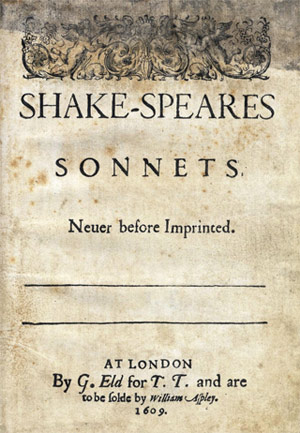Sonnet LXXIII:

BASIC FACTS:
Title: Sonnet LXXIII.
Author: William Shakespeare.
Date of composition: 1590s.
Date of publication: 1609. Shakespeare’s sonnets were first published by Thomas Thorpe without the consent of the author.
Collection: Sonnets.
Poetic genre: Sonnet.
Metric: Poem composed according to the English or Shakespearean sonnet scheme: 14 iambic pentameters divided into three quatrains and a final couplet.
Rhyme: The rhyme pattern is the following: ABAB CDCD EFEF GG.
FURTHER INFORMATION:
Major Themes:
The main theme of this sonnet is time and its effects on human beings, in this case the subject of the poem who may be Shakespeare. The speaker talks about his own old age. Another theme is the loss of beauty which also related to the aging process.
Symbols:
The passing of the seasons and then the passing of the hours of a day represent the passing of the lifetime.
After all the hours of light have passed, the night is described as “death’s second self”. As in other sonnets the sun stood for life, here the absence of sun means death.
Fire stands for life and once the fire is extinguished, there is no way back, it’s the end. It is not reborn from its ashes. The extinguishment of fire means death.
Beauty doesn’t appear explicitly but in the final line the element that one must leave is beauty, which disappears with age.
To love that well which thou must leave ere long. (l.14)
Literary devices:

- Anaphora:
In me thou seest the twilight of such day
As after sunset fadeth in the west,
In me thou see’st the glowing of such fire
As the death-bed whereon it must expire.
- Metaphor:
We find here a series of metaphors which make reference to the same idea: the subject’s old age.
That time of year thou mayst in me behold
When yellow leaves, or none, or few, do hang
Upon those boughs which shake against the cold,
In these lines, the poet describes the late autumn which leads to the winter, which as we have said represents the old age of the subject of the poem.
In me thou seest the twilight of such day
As after sunset fadeth in the west,
Which by and by black night doth take away,
Here, Shakespeare compares life with a day, old age with the twilight and night with death.
In me thou see’st the glowing of such fire (l.9)
That on the ashes of his youth doth lie, (l.10)
The author compares himself with a fire and says that he is now just the ember of the fire that he was in his youth.
- Paradox:
Consumed with that which it was nourish’d by.
Here, Shakespeare is talking about the fire consumed by the flames, but what we find once again is the paradox of time which the author develops in many of his sonnets. Time gives you everything and then it consumes you, it kills you.
Sources:
Mabillard, Amanda. An Analysis of Shakespeare's Sonnet 73. Shakespeare Online. 2000. 10 May 2012 < http://www.shakespeare-online.com/sonnets/73detail.html>.
http://www.gradesaver.com/shakespeares-sonnets/study-guide/section7/
http://www.sparknotes.com/shakespeare/shakesonnets/section4.rhtml



